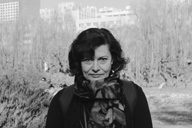Juror
Dina Iordanova
 [Juror’s Statement]
[Juror’s Statement]
Many of my esteemed colleagues keep saying that as they grow older, they get more and more interested in silent film. Not me. If there is one thing that I grow more and more interested in as time passes, this is documentary film. It helps me stay in touch with the world and the state of things in it.
As a film professor, one of the things I do daily, is watch films. And, in the course of thirty years, I have seen a really large number of films, of all genres and types. Documentary, however, has always had a special standing, and it grows in importance for me. I find myself preferring to watch documentaries over features, whenever I have the opportunity. Within the last year alone, I had the chance to experience the power of documentary films in a variety of settings and contexts—I watched the inspiring Mr. Gaga, about choreographer Ohad Naharin, at Dizengoff Center in Tel Aviv. Then I saw a documentary about photographer Ara Güler at Istanbul Modern in Turkey. I watched the insightful Slovenian Houston, We Have a Problem! at the campus cinema of the Beijing Film Academy and Ukrainian Vitaly Mansky’s Close Relations at the Olympion theatre in Thessaloniki, Greece. More recently, in Paris in June, I saw Agnès Varda and JR’s Faces Places, in the presence of the inspiring 89-year-old director, at the magnificently restored Le Louxor.
Many other important documentaries, I watched through links online—classics by Armenian Artavazd Peleshyan, Syrian Omar Amiralay and Cypriot Michael Cacoyannis, as well as new topical films by Syrian Talal Derki or Bulgarian Eldora Traykova.
Coming originally from the Balkans, I admire the work of documentarians from the region—with veteran Serbian Želimir Žilnik being by far my most esteemed friend—I think of him as a titan of activist-type gureilla filmmaking. Recent personal encounters with other great documentarians from the region—like Greek Menelaos Karamaghiolis and Romanian Alexandru Solomon, respectively proponents of poetic cinema and acerbic social analysis—were truly important for me.
Documentary filmmaking coming from Asia is subtle and profound, even though I find it difficult to see everything of importance that is being made here. I was overjoyed to read the other day that the Locarno festival awarded the new film by Wang Bing, a filmmaker whose entire oeuvre I hold in the highest esteem.
Coming to Yamagata has been a long-standing interest for me. I know so much about the festival and its admirable history and people. I cannot wait to take the trip to Japan—a country of filmmaking of remarkable sensitivity and insights.
Dina Iordanova is Professor of Global Cinema at the ancient University of St Andrews in Scotland and is the author of nearly twenty books dedicated to the film traditions of the non-Western world and the dynamics of global cinema. Her main interest is in the way global cinema circulates. She has taught and given talks in Canada, the USA, and across Europe and Asia. Originally from Bulgaria, she has published a number of books and articles exploring the cinema of the Balkan region, Eastern Europe and the lands of the former Soviet Union. Having travelled extensively, she commissioned and built work dedicated to the world of film festivals—a strand of scholarship that gave rise to a thriving new aspect of the study in film cultures. Dina is a leading figure in this field. Her work is translated into more than twenty languages and she works with a range of doctoral students who come from around the world. In more recent years, she has developed a specific interest in Asia. In 2014 she served on the jury of the Busan IFF, in 2016 she was guest professor at the Beijing Film Academy, and in the immediate future she will be a Distinguished Research Professor at the University of Hong Kong. Her most recent book is Cinemas of Paris (2016, French translation 2017). Dina Iordanova is particularly interested in documentary cinema. She organised a conference on political documentary and recently served on the inaugural jury of the Thessaloniki Documentary Festival.
